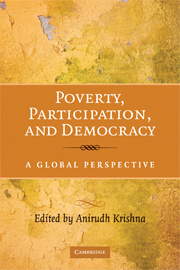Book contents
- Frontmatter
- Contents
- Preface
- Contributors
- Poverty, Participation, and Democracy
- 1 Introduction: Poor People and Democracy
- 2 Poor People and Democratic Citizenship in Africa
- 3 Do Poor People Care Less for Democracy? Testing Individual-Level Assumptions with Individual-Level Data from India
- 4 Inequality and Democracy in Latin America: Individual and Contextual Effects of Wealth on Political Participation
- 5 The Poor and the Viability of Democracy
- 6 Conclusion: Implications for Policy and Research
- Bibliography
- Index
1 - Introduction: Poor People and Democracy
Published online by Cambridge University Press: 14 May 2010
- Frontmatter
- Contents
- Preface
- Contributors
- Poverty, Participation, and Democracy
- 1 Introduction: Poor People and Democracy
- 2 Poor People and Democratic Citizenship in Africa
- 3 Do Poor People Care Less for Democracy? Testing Individual-Level Assumptions with Individual-Level Data from India
- 4 Inequality and Democracy in Latin America: Individual and Contextual Effects of Wealth on Political Participation
- 5 The Poor and the Viability of Democracy
- 6 Conclusion: Implications for Policy and Research
- Bibliography
- Index
Summary
Social scientists have steadily believed that democracies will more likely exist in richer rather than poorer countries. Analyses of cross-country data have consistently shown democracy to be more prevalent and more stable in countries that have higher-than-average per capita incomes. Based on these statistical observations, a law-like regularity has been postulated, proposing social prerequisites for democracy, stated in terms of material achievement. Continuing in this vein, a comprehensive analysis concluded that the probability democracy will survive in a country “increases steeply and monotonically as per capita incomes get larger. Indeed, democracy is almost certain to survive in countries with per capita incomes above $4,000.” Below this level of per capita income, democracy is considered to be at grave risk: “We have learned that the bonds of poverty are difficult to break, that poverty breeds dictatorships” (Przeworski, et al. 2000: 273, 277).
These expectations are, however, confounded by some recent events. Over the past few decades, democracy has broken out of its erstwhile confines. Today, democracy is no more “the exclusive preserve of wealthy lands,” states Karatnycky (2004: 83). “Many poor and developing countries achieve a record of respect for political and civil libertiesthe survey data show that there are 38 [democratic] countries with an annual Gross National Income per capita (GNIpc) of US$3,500 or less. Of these [countries], 15 are places where yearly GNIpc is below US$1,500” – that is, less than half the threshold level proposed by Przeworski et al. (2000).
- Type
- Chapter
- Information
- Poverty, Participation, and DemocracyA Global Perspective, pp. 1 - 27Publisher: Cambridge University PressPrint publication year: 2008
- 6
- Cited by



